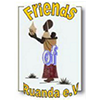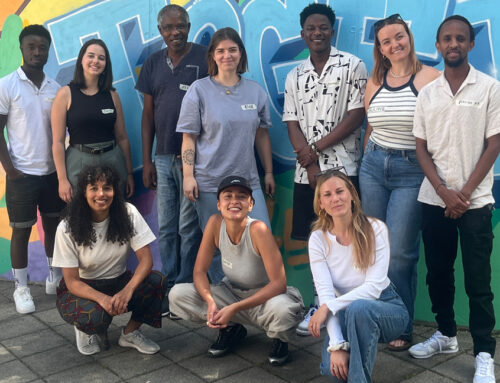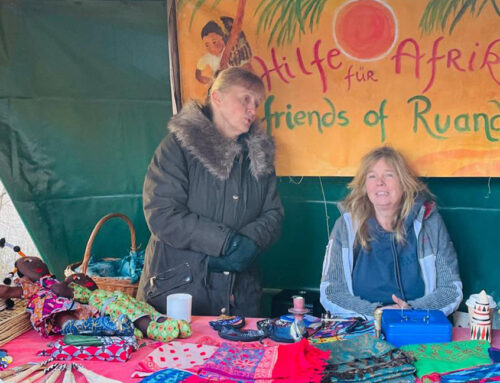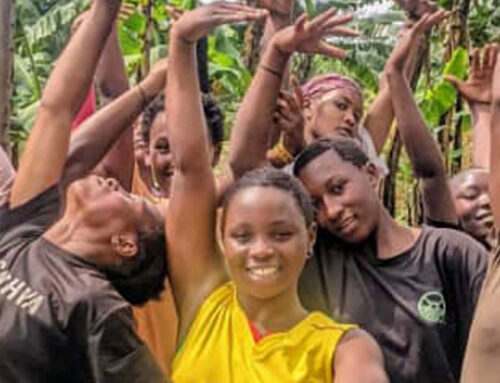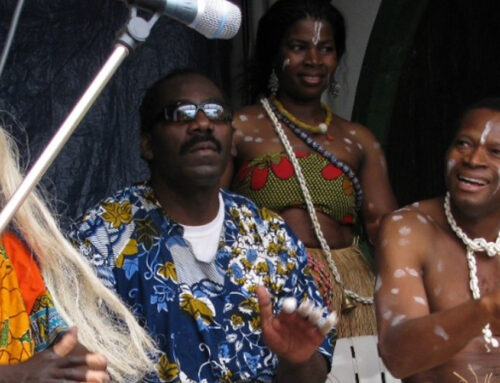On January 12, 2019, Friends of Ruanda was part of the New Year’s Meeting in Bad Boll. Here, people and associations that provide special services to the community are honored. As part of this event, Jobst Kraus, a citizen of Bad Boll with close ties to the association, gave a speech in honor of Friends of Rwanda. Jobst Kraus used to run the Environmental Resort of the Evangelical Academy Bad Boll. Here is a transcript of his laudatory speech.
Dear guests, dear citizens of Bad Boll,
As an admirer of Friends of Ruanda, I am delighted to be able to present this fantastic initiative to you today.
Before I come to the Friends, I would like to introduce you to Rwanda. I would like to draw your attention to a country some 6,000 km away. The signpost on the town hall lawn reads “Kigali 5,970 km” (Kigali is the capital with 750,000 inhabitants).
Rwanda is a landlocked country just south of the equator in East Africa. It borders Burundi, the Democratic Republic of Congo, Uganda and Tanzania. Because of its hilly landscape, Rwanda is also known as the “land of a thousand hills”. From 1884 to 1916, Rwanda was a German colony as part of German East Africa. After the First World War, it became part of the Belgian Congo and gained independence in 1962. Rwanda is one of the smallest countries in Africa, not quite as large as Baden-Württemberg in terms of area, but with over 13 million inhabitants it has more than our federal state. With 463 inhabitants per km², it is one of the most densely populated countries in the world. While the neighboring country of Burundi is a partner country of Baden-Württemberg, Rwanda has close ties with Rhineland-Palatinate.
Until the genocide of 1994, when almost one million people were killed, the Hutu and Tutsi groups lived together amicably under the African philosophy of “Ubuntu” with mutual respect and the desire for a harmonious and peaceful society. The country’s elites and President Paul Kagame have learned from the disaster. They are now focusing on poverty reduction and a liberal, low-corruption economy. The government is setting further standards, not only with rapid economic development, but also with measures that are causing a stir worldwide, such as the ban on the import of used clothing since January 1, 2019, in order to strengthen the country’s own market for textiles or the ban on plastic bags. Here in Bad Boll, we can also “learn from Africa” when it comes to the latter.
In order to win over the general public, members of the government, for example, also practically grab a broom and sweep up the garbage on the street. Rwandan society is characterized by the unusually high participation of women in economic and political power. In the United Nations Gender Development Index, which measures the differences in the socio-economic development status of women compared to men, Rwanda took the top spot among all developing countries and even scored better than Germany. There is certainly a female conductor in Rwanda, just as there recently was in the Bad Boller Musikverein.
In Rwanda, we can experience and see on a daily basis what countries in Africa can become if they make use of their opportunities. They have to go their own way. Rwanda seems to be demonstrating this to the world more than other African countries. But this also requires help for self-help.
And this has been provided by Friends of Ruanda since 2006. You have probably already seen the initiative’s stand at the Christmas market, whose members are immediately recognizable by their colourful robes. You have heard them drumming at festivals in Bad Boll or experienced for yourself how the deputy ambassador from Berlin spoke on the church square in July 2016 to mark the tenth anniversary of the non-profit association, which currently has 64 members.
From the very beginning, the aim of Friends of Ruanda was to offer help for self-help. Locally developed projects are intended to improve the living conditions of the population directly and in the long term in an unbureaucratic manner. To ensure this, Friends of Ruanda works closely with its Rwandan partner organizations. Together they are involved in the vocational training of young people, the resource-saving supply of drinking water and energy, medical care and support, and the organization of handicraft businesses. It is impressive to read the list of completed and ongoing projects.
The “Rubavu Technial College” is a vocational college funded by Friends of Ruanda in the north-west of Rwanda. The school was opened in 2013 and trains young adults in gastronomy, hospitality and tourism, which also aims to promote a still young economic sector. The school currently has 412 students, around 300 of whom live in the affiliated boarding school
It is particularly worth mentioning that the establishment of the development volunteer service, the so-called weltwärts program, in 2008 means that the association can now also send volunteers to projects in Rwanda with financial support from federal funds. Over the past ten years, 42 young people have been involved in five different local projects for twelve months, thus strengthening relations between Rwanda and Germany. The volunteers are involved in working with the young people, but also in supporting the local teachers.
The volunteers assist the teachers in subjects such as languages (English, German), IT and sport. Some of you will know one or two young people from Bad Boll who have volunteered in Rwanda and who have often had a formative experience with weltwärts in terms of their own career path.
A few years ago, I had the opportunity to meet the volunteers at a preparatory seminar in a self-catering house near Bissingen and was impressed by the careful preparation – including in the area of intercultural communication.
The final round of applications was completed on December 31, 2018. After a preparation period with introductory seminars, the new volunteers will then head off to Rwanda for twelve months in August. In the past, volunteers have also helped to set up a center for street children.
This is by no means the end of Friends of Ruanda’s impressive list of commitments.
- Sponsorships are arranged to enable children to pay school fees or tuition fees. As little as €50 can enable a child to attend school for a year;
- Microloans are financed so that a business idea, e.g. tailoring or carpentry, can be realized – and the loans are repaid on time;
arranged work shadowing: the kitchen managers at the Bad Hotel Stauferland or the Protestant Academy will still remember the work shadowing of hotel and catering teachers in their kitchens arranged by the association; - Companies from the GP district were recruited to help train solar technicians
And Friends of Ruanda has collected a lot of donations for all of this – often “drummed up”.
Your commitment fits in wonderfully with Bad Boll as a fair trade community, as does the commitment of other Bad Boll institutions that carry out practical development work. The partnership work of Friends of Ruanda and all the other initiatives are an important and necessary addition to the Fair Trade concept. In order to achieve a good life for all people on this earth and thus reduce the causes of flight, we need not only Friends of Ruanda, but Friends of the World. We need municipalities and their citizens who want to implement the 2030 Agenda signed by the global community and take joint global responsibility, for example for the climate, biodiversity, water and soil.
Friends of Ruanda is a role model and an incentive to move from talk to action, or as the Rubavu College website puts it: “Well done is better than well said”.
An association is only ever as good and successful as those who are involved in it. That is why you – on behalf of all members – are being honored today. Personally, I hope that the current momentum continues and that the association continues to find resonance in Bad Boll.
We welcome the New Year today. I would like to end with “Welcome” in your native language, Eliphaz:
Murakaza neza.
